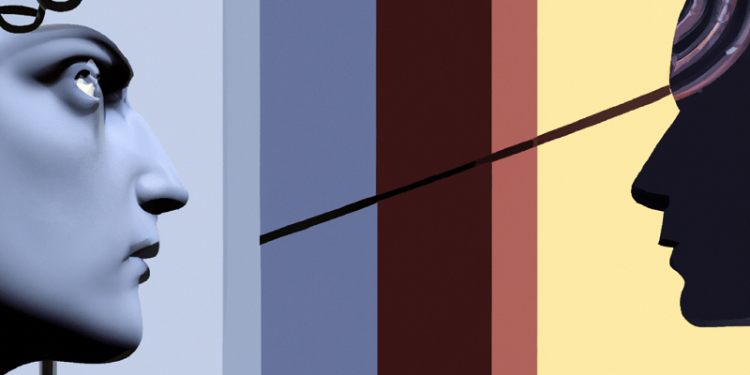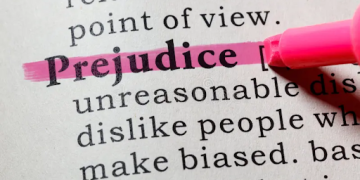A philosophical consideration that attempts to decode the very essence of perspectives by analyzing the duality in their nature.
Highlights:
- “Thus, the ultimate truth for us, which differentiates us from all living creatures, is fantasy.”
- “If minimalism could contain the very experience of the life of every living being in one word, which would be ‘perspective’.”
- “…considering one’s perspective before critically assessing the action and its implications, should be of the utmost importance, when considering perspectives.”
Perspective.
If minimalism could contain the very experience of the life of every living being in one word, that would be ‘perspective.’
Truly, by being a subject originating from the broader analysis of logic and reason, the matter of perspective pondered the minds of great philosophers from time immemorial.
Plato, Aristotle, and Socrates all tried to narrow down the essence of reason, and henceforth perspective, via the creation of theories such as Plato’s Theory of Forms, which is based upon relational logic, and Aristotle’s Prior Analytics (Which is one of the works on logic, branched under Aristotle’s theory of Organon), which paved the way for the Western philosophies of today.
Even before those great men, there were pre-Socratic philosophers such as Heraclitus, who supported the idea that the world (And humanity) is in a constant state of change (Flux) and that the unity of this world is caused by the tension produced between the opposites that make it what it is (Unity of opposites).
However, another ideology that Heraclitus also supported, which later came to be picked up by Socrates, Plato, Aristotle, Zeno of Citium, and stoicism, is the idea of Logos. The very concept of the ultimate meaning of everything makes life, as we perceive it, the truth (Minar, 1939).
Though what is truth? Is it really something which, after constant observation, we finalize on the conclusion of its absolute nature? Or are there always going to be two sides of the same coin?
The material world’s perspective and the aether’s perspective?
One would find themselves baffled by a plethora of dialectic thoughts once they try to decode the very meaning of truth and whether reality itself is bar an illusion created by humanity’s imperfect sight, and blurred logic.
The truth is always hard to discern. Whether it is the very nature of black holes, which endlessly(?) absorb actual and dark matter alike, or the words of a fellow human.
Is the truth hidden in the actual mathematical equations that represent a gravitational anomaly and in the meanings behind a being’s words? Or is it hidden within the implications they have upon the onlooker? In which case, the universe or the listener.
How do we, as people, perceive the world and other people around us?
To answer the above dilemmas, a single theory may provide the necessary guidance so as to decode what we consider truth.
The Dual-Process Theory
Deep within the psychological essence of homo sapiens lies the above scientific theory, which supports the argument that each one of us has two different kinds of thinking; One, which is intuitive and instantaneous, and another, which is slower and deliberate (Evans; Stanovich, 2013).
Just as supported by the ancient philosophers, modern science and psychology have come so far as to finally confirm the legendary folk knowledge that was grounded by the philosophical considerations of those wise men two millennia ago. With the man on the frontier being Heraclitus, the dark one.
To further establish the above argument, anatomically speaking even, control processing in humans is indeed very unique since they have unique facilities for meta-representation and language, accompanied by extraordinarily enlarged frontal lobes (Evans; Stanovich, 2013), far bypassing most animals in their capacity for imagination.
Thus, the ultimate truth for us, which differentiates us from all living creatures, is fantasy.
One tends to suffer or assuage in fantasy more so than in reality.
Such is the truth for our perspectives, partially, and such is its effect upon our realities.
Perhaps, by proposing that we have the inherent trait to partially perceive the world via one intuitive method, one would assume that modern human has full control over their surroundings and perhaps even hold a secret perception mechanism (A third-eye echolocation if you would like), which can understand everything around them; by extend, baptizing all humans as half-angelic in nature (Sahlin; Wallin; Persson, 2010).
Though, is it really that way? Do we really understand everything intuitively, only limited by our distinctive genomes? Consequently, making decisions to accept a specific perspective as truth by combining our intuitive capacity with an information decoding mechanism we develop throughout the years?
This matter, albeit more philosophically oriented, was the main concern of another modern philosopher, named Jean-Jacques Rousseau, who tried to explain, among other ideas, how “… honour without virtue, reason without wisdom, and pleasure without happiness. It is sufficient that I have proved that this is not by any means the original state of man, but that it is merely the spirit of society, and the inequality which society produces, that thus transform and alter all our natural inclinations.”

Carefully reading the words of that great philosopher, one comes to wonder whether his words can become applicable or, under a more careful inspection, become expanded upon the dilemma of our question now.
“Is our information decoding mechanism affected, and architecturally structured, by the society around us, including our close circle, the entertainment we absorb, the religion we embrace, and everything in between? And even if it is, how can we discern the primordial and pure form of our distinctive mechanisms? How can we reach, the basis of ‘how would we perceive that on our own accord?’”
By a mere consideration of the above question, a plethora of dialectic conversations can flood our minds with questions, the foremost being, “But, are we not influenced from the moment we are born? How can we remember that which we have never experienced?”.
The above analysis becomes blurring once the concept of human mutation delves its implications unto the conversation since all humans can, and most probably will, undergo a mutation throughout the course of their lives, thus not only eternally changing their descendants and themselves (Loewe; Hill, 2010), but also putting philosophers into yet another dilemma.
‘What caused the mutation? The externalities’ effect on the mind? Or was it the intuitive nature of the being?’
Though, moving away from the biological aspect of the argument, it begs to mention that the Dual Process Theory entails the argument that those two types of thinking mechanisms, the subconscious, and the conscious process, are not two contrasting or alternative routes but rather, offer a concise theory on how their respective two results may materialize from the interaction of their distinct mental systems (Deutsch; Strack, 2006).
How those distinct mental systems are created, though, is a wholly different situation.
Scholars, philosophers, psychology practitioners, and all alike will consequently agree on the following though: “By analyzing the concept of perspective, or cognitive architecture, one comes to acknowledge that the implicit and subconscious reasoning of humans will come to be inherited, be self-created, and bury itself within the deepest part of the soul, whereas its companion, the more recently-created rule-based explicit reasoning system will slowly be created by the very society (And by extend reality) one belongs in.
However, the whole mystery of individuals is hidden in the “Goldilocks zone” of the two.
Individuals will still somehow create a perspective via reasoning that their own selves will shape over the years, and of which, every mutation, every inter-affect, and every thought process that it will follow will be the utmost representation of oneself.
And here, the most important realization appears.
Though before that, allow me to preface this by quoting a movie I discovered recently as an example of the upcoming point.
“Sound of Metal” is a movie about a drummer who loses his hearing and who consequently goes through a process of cleansing. Though, the most interesting part is that in that movie, there are many scenes that were captioned for the deaf, something that the movie’s director, Mr. Darius Marder, said was done in an effort to “… bringing together two distinct cultures and enjoying a film together. And that means we all experience the film slightly differently, but we do it together in the same room”.
In the current writer’s humble opinion, the whole reason we are concerned over the matter of perspective is hidden within this simple truth.
Understanding the person next to you helps you understand yourself and the world better, and by doing so, you can better form a bond with them, thus creating a culture.
The whole meaning and overall goal of cultures, communities, and social interactions, in general, is to find a peaceful, meaningful, and perhaps intellectual way to unite people by finding common ground on their perspectives. As we are endlessly bound to perceive things differently.
It would take tremendous effort to try and individualize every person’s perspective into fitting one model that can successfully be implemented by all for all.
Eventually, if we are to distance ourselves away from evaluating the source or the structure of perspective and critically evaluate its basis, we will come to find out that all perspectives are subjective.
It may be fundamentally true that our mental lives and behaviors are affected by our two different “sources of logical evaluation” (Deutsch; Strack, 2006), but considering one’s perspective before critically assessing the action and its implications should be of the utmost importance when considering perspectives.
People’s lives, thoughts, thought processes, and actions are subjective and make sense to them, and even their very actions can be interpreted differently by different people with different approaches to life, with different perspectives.
For this exact reason, theories about life have been succeeded by other theories that explain the same subject, with contrasting opinions.
Whereas realism, for example, tries to reject imaginative idealization and observe life in its plain and raw form that is observed through objective observation, ideals like romanticism use imagination to transmute that raw observation into something magical that everyone else, even life itself, never bothered to realize as such.
The wonderful, yet at the same time frightening, factuality about perspectives is that an x result (Be it a song, an event, a conversation, an image, art, etc.) can be interpreted by each one of us through ways we do not fully understand, nor are fully (Or at least, knowledgeable at) in control of.
At the same time, those perspectives take a different approach, a different thought process, by each individual; thus, entailing that the very nature of x can be accepted, or “baptized” if one likes, as something so drastically different from what the ‘creator’ of x intended, that its very essence changes with it.
Such is life. And such are the truths of it.
It would do no good for academia, psychology, or everyday life, to argue over the very true nature of life, for it is what we make of it, or rather, what we perceive of it.
To extend, our lives take shape in what (Or how) we believe them to be. As long as we act upon them.
Ultimately, psyches, now and forever, should be reminded of the following allegory: “… Holy Church blames humans for sin, but God does not.” (Van Engen, 2009).
The meaning thereof remains a matter of, well, perspective.
Works Cited
Deutsch, R., & Strack, F. (2006). Duality models in social psychology: From dual processes to interacting systems. Psychological Inquiry, 17(3), 166-172.
Evans, J. S. B., & Stanovich, K. E. (2013). Dual-process theories of higher cognition: Advancing the debate. Perspectives on psychological science, 8(3), 223-241.
Loewe, L., & Hill, W. G. (2010). The population genetics of mutations: good, bad and indifferent. Philosophical Transactions of the Royal Society B: Biological Sciences, 365(1544), 1153-1167.
Minar Jr, E. L. (1939). The logos of Heraclitus. Classical Philology, 34(4), 323-3
41.
Sahlin, N. E., Wallin, A., & Persson, J. (2010). Decision science: from Ramsey to dual process theories. Synthese, 172, 129-143.
Van Engen, A. (2009). Shifting Perspectives: Sin and Salvation in Julian’s A Revelation of Love. Literature and theology, 23(1), 1-17.

















Discussion about this post